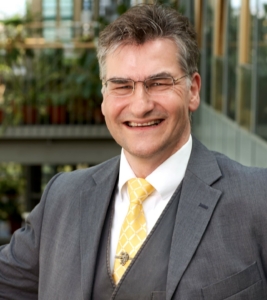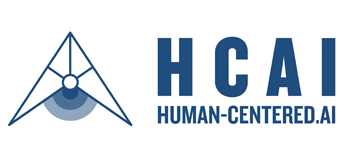
Univ.-Prof. Dr. Andreas HOLZINGER
PhD, MSc, MPh, BEng, CEng, DipEd, MBCS, MAE, ifip Fellow
Endowed Chair for Digital Transformation in smart farm and forest operations
Head of Human-Centered AI Lab (HCAI-Lab)
Human-Centered AI Lab | GitHub | TEDx | AVO | Scholar | DBLP | ORCID | LinkedIN
BOKU University Vienna, Austria
Department of Ecosystem Management,
Climate and Biodiversity, Institute of Forest Engineering,
A-1190 Wien, Peter-Jordan-Straße 82
HCAI Lab: A-3430 Tulln/Donau, Konrad-Lorenz-Strasse 20
Medical University Graz, Austria
Institute for Medical Informatics, Statistics & Documentation
University of Technology Graz, Austria
Institute of Human-Centred Computing
University of Alberta, Edmonton, Canada
xAI-Lab, Alberta Machine Intelligence Institute
The use of AI in domains that impact human life has led to increased demand for trustful and controllable AI.
Andreas Holzinger pioneered in interactive machine learning with the human-in-the-loop promoting robustness and explainability to foster trustworthy AI. He advocates a synergistic approach of Human-Centered AI (HCAI) to put the human in-control of AI, aligning artificial intelligence with human intelligence, social values, ethical principles, and legal requirements to ensure secure, safe and controllable AI.
For his achievements he was elected a member of Academia Europaea in 2019, the European Academy of Science, of the European Laboratory for Learning and Intelligent Systems (ELLIS) in 2020, and Fellow of the international federation of information processing (ifip) in 2021. He obtained his Ph.D. with a topic in Cognitive Science from Graz University in 1998, and his Habilitation (UOG 93, venia docendi) in Computer Science from Graz University of Technology in 2003. Andreas was Visiting Professor for Machine Learning & Knowledge Extraction in Verona (Italy), RWTH Aachen (Germany), and the University College London (UK). From July 2019 until February 2022 Andreas was a Visiting Professor for explainable AI at the University of Alberta (Canada). Andreas Holzinger has been appointed full professor for digital transformation in smart farm and forest operations at the University of Natural Resources and Life Sciences Vienna and had his inaugural lecture on November, 7, 2022 – see https://human-centered.ai/antrittsvorlesung-andreas-holzinger
Andreas Holzinger serves as consultant for the Canadian, US, UK, Swiss, French, Italian and Dutch governments, for the German Excellence Initiative, and as national expert in the European Commission (EC). Andreas is in the advisory board of the Artificial Intelligence Strategy AI made in Germany 2030 of the German Federal Government.
Artificial Intelligence (AI) has become remarkably successful thanks to advances in statistical machine learning. The power of large language models (e.g. LLaMA, Alpaca, LaMDA/Bard, Chinchilla, ChatGPT, GPT-4, …) are excellent examples of the current state-of-the-art. Such models even outperform humans in certain tasks. Humans, however, are sometimes excellent at multimodal reasoning and can embed new information almost instantly into a conceptual knowledge space shaped by individual experience and previous knowledge. Andreas Holzinger’s vision is to create systems that are able to explain themselves by, for example, engaging a human expert in interactive counterfactual “what if” questions. Andreas Holzinger’s guiding principle is that using conceptual knowledge and common sense (Hausverstand) from an domain expert as a guiding model of reality can help develop more robust, interpretable, and less biased machine learning models that can ideally learn from less data. This can a) bring advanced contributions to the international research community, b) find application in various AI solutions, c) help generate added value for practitioners, particularly in domains that impact human life (agriculture, climate, forestry, health, soil, …), see curent work:
https://doi.org/10.1016/j.inffus.2025.103032
At the BOKU Human-Centered AI (HCAI) Lab at the Institute of Forestry Technology in Tulln/Danube, Andreas Holzinger is researching the development of human-centered artificial intelligence to reconcile digitization and digital transformation with human values, ethical principles and legal requirements to ensure safety and security in human-machine interaction. The HCAI lab is currently focusing on Multi-Objective Counterfactual Explanations with a human-in-the-loop to help achieve Forestry 5.0. In the first step, the laboratory is concentrating on concrete applications from forestry, in particular forest roads (dynamic prediction of trafficability, optimization of planning), as well as cable retraction in steep terrain (autonomous systems, optimization of route planning, reduction of fuel consumption, simulators for training) and energy autonomy of cyber-physical systems and help to use AI for mitigating climate change!
The Sustainable Development Goals (SDG) of the United Nations are always taken into account, in particular:
1) SDG 3 Health and Wellbeing -> One Health (healty humans on a healthy planet)
2) SDG 12 Responsible Consumption and Production = Ensure sustainable consumption and production patterns
3) SDG 15 Life on Land = Protect, restore and promote sustainable use of terrestrial ecosystems, sustainably manage forests, combat desertification, and halt and reverse land degradation and halt biodiversity loss
Technically, we concentrate on these three main topics:
1) Robotics > embodied intelligence, human-in-the-loop > Explainability
2) 3D Point Cloud Data > Graph Neural Networks > Explainability/Counterfactuals
3) Transformer > Causal inference/learning > Explainability/Counterfactuals
Kurzbio Deutsch:
Andreas Holzinger leistete Pionierarbeit auf dem Gebiet des interaktiven maschinellen Lernens mit dem Human-in-the-Loop Konzept, um Robustheit, Nachvollziehbarkeit, Erklärbarkeit und damit vertrauenswürdige Künstliche Intelligenz (KI) zu fördern. Er setzt sich für einen synergetischen Ansatz menschenzentrierter KI ein, um neue Technologien mit menschlichen Werten, ethischen Grundsätzen und rechtlichen Anforderungen in Einklang zu bringen, damit Privatsphäre, Sicherheit und Schutz gewährleistet sind.
Für seine Leistungen wurde er 2019 zum ordentlichen Mitglied der Academia Europaea, der Europäischen Akademie der Wissenschaften, 2020 zum Mitglied des European Laboratory for Learning and Intelligent Systems (ELLIS), und 2021 zum Fellow der International Federation of Information Processing (ifip) gewählt. Er promovierte 1998 zum Dr.phil. mit einem Thema im Bereich der Kognition an der Universität Graz, und habilitierte sich 2003 nach UOG 93 (Univ.-Doz.) in Angewandter Informatik an der Technischen Universität Graz. Andreas Holzinger war Gastprofessor für Maschinelles Lernen und Wissensextraktion in Verona (Italien), an der Rheinisch-Westfälischen Technischen Hochschule RWTH Aachen (Deutschland), und am University College London (Großbritannien). Von Juli 2019 bis Februar 2022 war er Gastprofessor für erklärbare künstliche Intelligenz an der University of Alberta (Kanada). Andreas Holzinger wurde zum Univ.-Prof. für Digitale Transformation für intelligente Land- und Forstwirtschaft an die Universität für Bodenkultur (BOKU) Wien berufen und hielt am 7.November 2022 seine Antrittsvorlesung – siehe https://human-centered.ai/antrittsvorlesung-andreas-holzinger
Andreas Holzinger ist als Berater für die kanadische, US-amerikanische, britische, schweizerische, französische, italienische und niederländische Regierung, für die deutsche Exzellenzinitiative und als nationaler Experte in der Europäischen Kommission (EK) tätig. Andreas Holzinger ist Mitglied des Beirats der Strategie Künstliche Intelligenz – KI Made in Germany 2030 der deutschen Bundesregierung.
Forschung:
Künstliche Intelligenz (KI) ist dank der Fortschritte beim statistischen maschinellen Lernen bemerkenswert erfolgreich geworden und übertrifft in bestimmten Aufgaben sogar menschliche Leistungen. Allerdings zeichnen sich Menschen in bestimmten Aufgabenstellungen durch multimodales Denken und die Einbettung neuer Informationen in einen konzeptionellen Wissensraum aus, der durch individuelle Erfahrungen und Vorwissen geprägt ist. Andreas Holzingers Vision ist es, Systeme zu schaffen, die in der Lage sind, sich selbst zu erklären, indem sie zum Beispiel menschliche Experten in interaktive kontrafaktische “Was wäre wenn”-Fragen einbinden. Andreas Holzingers Leitgedanke ist, dass die Verwendung von konzeptuellem Wissen als Leitmodell der Realität dazu beitragen kann, robustere, interpretierbare und weniger voreingenommene maschinelle Lernmodelle zu entwickeln. Dies kann a) fortschrittliche Beiträge zur internationalen Forschergemeinde bringen, b) in verschiedenen KI-Lösungen Anwendung finden, sowie c) helfen Mehrwerte für die Praxis zu generieren, insbesondere in Bereichen, die das menschliche Leben beeinflussen (Land- und Forstwirtschaft, Klima, Gesundheit, …).
Im BOKU Human-Centered AI (HCAI) Lab am Institut für Forsttechnik in Tulln/Donau forscht Andreas Holzinger an der Entwicklung menschenzentrierter Künstlicher Intelligenz, um Digitalisierung und Digitale Transformation mit menschlichen Werten, ethischen Grundsätzen und rechtlichen Anforderungen in Einklang zu bringen, damit Sicherheit und Schutz in der Mensch-Maschine Interaktion gewährleistet sind. Schwerpunktmäßig beschäftigt sich das HCAI-Labor derzeit mit Multi-Objective Counterfactual Explanations with a human-in-the-loop, um mitzuhelfen Forestry 5.0 zu erreichen. Das Labor konzentriert sich im ersten Schritt auf konkrete Anwendungen aus der Forstwirtschaft, hier u.a. insbesondere Forststraßen (Dynamische Vorhersage der Befahrbarkeit, Optimierung der Planung), sowie Seilrückung im Steilgelände (Autonome Systeme, Optimierung der Trassenplanung, Reduzierung Treibstoffverbrauch, Simulatoren für die Ausbildung) und Energieautonomie von Cyber-Physikalischen Systemen.
Dabei werden stets die Ziele für nachhaltige Entwicklung der Vereinten Nationen zu berücksichtigt, im Besonderen:
1) SDG 3 Gesundheit und Wohlbefinden -> “One Health” (gesunde Menschen auf einem gesunden Planeten)
2) SDG 12 Verantwortungsvoller Konsum und Produktion = Nachhaltige Konsum- und Produktionsmuster sicherstellen
3) SDG 15 Leben auf dem Land = Landökosysteme schützen, wiederherstellen und ihre nachhaltige Nutzung fördern, Wälder nachhaltig bewirtschaften, Wüstenbildung bekämpfen, Bodendegradation aufhalten und umkehren sowie den Verlust der biologischen Vielfalt aufhalten
*) N.B. Causability is neither a typo nor a synonym for Causality in the sense of Judea Pearl. We introduced the term Causa-bil-ity in reference to Usa-bil-ity. While XAI is about implementing transparency and traceability, Causability is about the measurement of the quality of explanations, i.e. the measurable extent to which an explanation of a statement to a user achieves a specified level of causal understanding with effectiveness, efficiency and satisfaction in a specified context of use.
- Explainability := technically highlights decision relevant parts of machine representations and machine models i.e., parts which contributed to model accuracy in training, or to a specific prediction. It does NOT refer to a human model !
- Causality : = relationship between cause and effect in the sense of Pearl
- Usability := according to DIN EN ISO 9241-11 is the measurable extent to which a software can be used by specified users to achieve specified goals with effectiveness, efficiency, and satisfaction in a specified context of use, see Holzinger
- Causability := the measureable extent to which an explanation to a human achieves a specified level of causal understanding, see Holzinger) It does refer to a human model !
Successful mapping between Explainability and Causability requires new human-AI interfaces which allow a contextual understanding and let domain expert ask questions and counterfactuals (“what-if” questions). Critics of this approach continue to ask the question what the human-in-the-loop should do; my concrete answer: The human-in-the-loop can (sometimes – not always) bring in human experience and conceptual knowledge into AI processes – something which I remain to as Hausverstand (common sense) that the best AI algorithms on this planet are (still) lacking !
N.B. Causability ist weder ein Tippfehler noch ein Synonym für Causality im Sinne von Judea Pearl. Wir haben den Begriff Causa-bil-ity in Anlehnung an Usa-bil-ity eingeführt. Während es bei XAI um die Umsetzung von Transparenz und Nachvollziehbarkeit geht, geht es bei Causability um die Messung der Qualität von Erklärungen.
- Explainability := hebt technisch entscheidungsrelevante Teile von Maschinendarstellungen und Maschinenmodellen hervor, d.h. Teile, die zur Modellgenauigkeit im Training oder zu einer bestimmten Vorhersage beigetragen haben. Sie bezieht sich nicht auf ein menschliches Modell!
- Usability := (“Gebrauchstauglichkeit”) nach DIN EN ISO 9241-11 ist das messbare Ausmaß, in dem ein System für einen Benutzer ein spezifiziertes Niveau der Benutzbarkeit mit Effektivität, Effizienz und Zufriedenheit in einem spezifizierten Nutzungskontext erreicht, siehe Holzinger
- Causality := Beziehung von Ursache und Wirkung im Sinne von Pearl
- Causability := (“Ursachenerkennbarkeit” – in Erweiterung zu “Ursachentauglichkeit”) ist das messbare Ausmaß, in dem eine Erklärung einer Aussage für einen Benutzer (das menschliche Modell !) ein spezifiziertes Niveau des kausalen Verständnisses mit Effektivität, Effizienz und Zufriedenheit in einem spezifizierten Nutzungskontext erreicht, siehe Holzinger
Dies erfordert neue Mensch-KI-Schnittstellen, die ein kontextuelles Verständnis ermöglichen und es dem Domänenexperten erlauben, Fragen und Counterfactuals (“Was-wäre-wenn”-Fragen) zu stellen. Kritiker dieses Ansatzes stellen stets die Frage, was der Human-in-the-Loop tun soll; meine konkrete Antwort: Der Human-in-the-Loop kann (manchmal – natürlich nicht immer) menschliche Erfahrung und konzeptionelles Wissen in KI-Prozesse einbringen – etwas, ich bezeichne dies als Hausverstand – etwas was den besten KI-Algorithmen auf diesem Planeten (noch) fehlt !
Click here to add your
ORCID-ID: http://orcid.org/0000-0002-6786-5194
Publication metrics as of December 2024
Google Scholar citations: 30,232, Google Scholar h-Index = 85
Scopus h-Index = 58, Scopus citations = 14,311
Web of Science (Clarivate Science Citation Index SCI – formerly publons) = 50, WoS citations 9,188
DBLP Peer-reviewed conference papers c = 208, Peer-reviewed journal papers j = 123
own text
